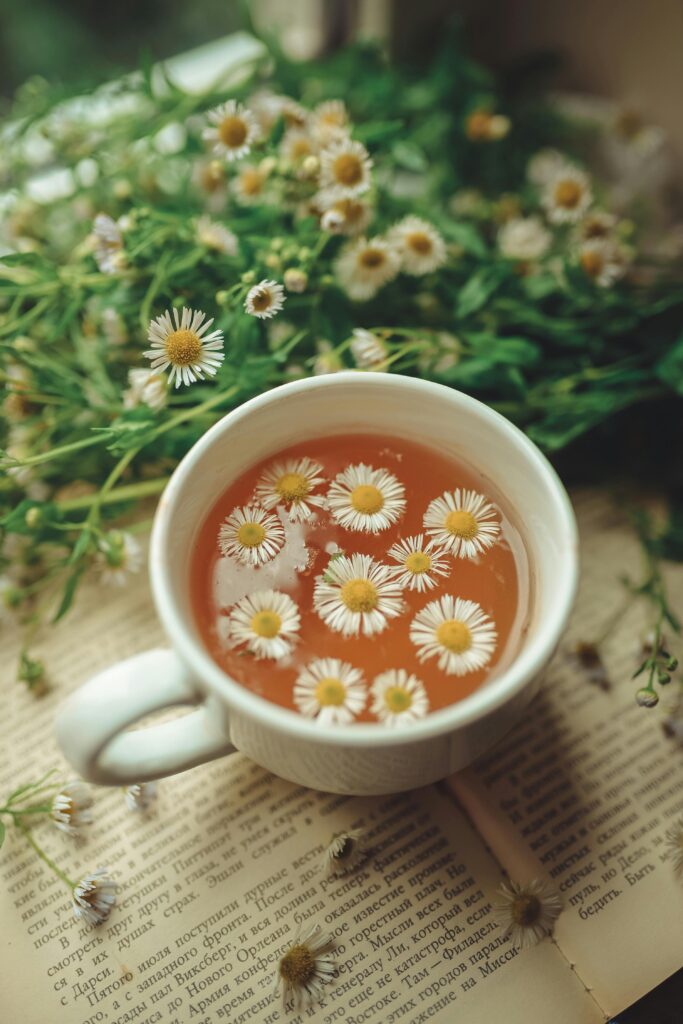Why Herbal Teas Can Improve Sleep Quality
Sleep is essential for health, yet millions struggle with falling asleep or staying asleep. Instead of relying on prescription sleep aids, many people are turning to herbal teas for a natural solution. These caffeine-free infusions, rich in calming plant compounds, have been used for centuries to promote relaxation and improve sleep quality.
Herbal teas work gently, helping both mind and body unwind. From the floral notes of chamomile to the earthy depth of valerian root, the right tea can prepare you for a deep, restorative slumber.
Understanding the Science Behind Herbal Teas and Sleep
How Herbal Compounds Affect the Nervous System
Certain herbs contain naturally occurring compounds—like apigenin in chamomile or linalool in lavender—that bind to brain receptors, reducing anxiety and promoting sedation. These phytochemicals act much like mild sedatives without the side effects of pharmaceuticals.
The Role of Caffeine-Free Beverages in Relaxation
Caffeine stimulates the central nervous system, making it harder to wind down at night. Herbal teas are naturally caffeine-free, ensuring that your bedtime drink won’t interfere with melatonin production or circadian rhythm.
Top 12 Best Herbal Teas for Sleep
1. Chamomile Tea – The Classic Sleep Inducer
Benefits and Active Compounds: Chamomile contains apigenin, a flavonoid that binds to GABA receptors in the brain, reducing anxiety and encouraging sleep.
Best Brewing Practices: Steep 2 teaspoons of dried chamomile flowers in hot water (90°C) for 5–7 minutes for optimal potency.
2. Lavender Tea – Aromatherapy in a Cup
Lavender’s aroma reduces heart rate and blood pressure, signaling to the body that it’s time to rest. Drinking lavender tea before bed can amplify these effects.
3. Valerian Root Tea – Nature’s Sedative
Valerian root is one of the most researched herbal sleep aids, known to improve deep sleep cycles. Its earthy flavor pairs well with lemon balm for a softer taste.
4. Lemon Balm Tea – Gentle Stress Relief
Lemon balm helps reduce cortisol, the stress hormone, making it easier to transition into sleep.
5. Passionflower Tea – Calming the Mind
Passionflower is effective for quieting racing thoughts and easing mild insomnia.
6. Peppermint Tea – Cooling Comfort Before Bed
Peppermint relaxes muscles and soothes digestion, making it ideal after a late dinner.
7. Rooibos Tea – Antioxidant-Rich and Caffeine-Free
Naturally sweet and rich in antioxidants, rooibos supports overall wellness while promoting relaxation.
8. Magnolia Bark Tea – Traditional Chinese Sleep Remedy
Magnolia bark has been used for centuries in traditional medicine to reduce anxiety and aid restful sleep.
9. Ashwagandha Tea – Adaptogenic Night Support
Ashwagandha helps regulate stress hormones, making it a great choice for people whose insomnia is linked to anxiety.
10. Tulsi (Holy Basil) Tea – Balancing Hormones and Stress
Tulsi tea can help regulate blood sugar and cortisol levels, improving sleep over time.
11. Ginger and Turmeric Tea – Anti-Inflammatory Relaxation
While not sedative in nature, this blend reduces inflammation, which can indirectly improve sleep quality.
12. Hibiscus Tea – Heart-Healthy Sleep Companion
Hibiscus lowers blood pressure and helps the body relax, setting the stage for restful sleep.

How to Choose the Right Herbal Tea for Your Sleep Needs
Identifying Your Sleep Challenges
Not all sleep problems are the same. Some people struggle with falling asleep due to anxiety, while others wake frequently because of digestive discomfort or hormonal imbalances. The best tea for you will depend on your primary challenge:
- Stress and racing thoughts – Chamomile, lemon balm, passionflower
- Muscle tension – Peppermint, lavender
- Digestive issues – Peppermint, ginger-turmeric blend
- Hormonal imbalance – Tulsi, ashwagandha
Matching Tea Benefits to Your Body’s Needs
If you’re looking for quick sedation, valerian root is a strong choice. If you want gentle, long-term improvement, adaptogens like ashwagandha may be better. Many people benefit from alternating teas depending on their nightly needs.
Brewing Tips for Maximum Sleep Benefits
Optimal Water Temperature and Steeping Time
- Chamomile, lavender, lemon balm, rooibos – Steep at 90–95°C for 5–7 minutes.
- Valerian root, magnolia bark – Use near-boiling water and steep for 8–10 minutes to extract full potency.
- Delicate flowers (passionflower, tulsi) – Steep at 85–90°C to preserve delicate compounds.
Enhancing Flavor Naturally
For a richer experience, add a slice of lemon, a drizzle of raw honey, or a pinch of cinnamon. Avoid sugar before bed, as it can spike blood sugar and disrupt sleep.
Best Times to Drink Herbal Tea for Sleep
The ideal time to drink herbal tea is 30–60 minutes before bed. This allows your body to absorb the active compounds and enter a more relaxed state before you lie down. For stronger sedative teas like valerian root, start on the earlier side to avoid morning grogginess.
Potential Side Effects and Precautions
While herbal teas are generally safe, some can cause allergic reactions or interact with medications:
- Chamomile – May cause reactions in people allergic to ragweed.
- Valerian root – Can cause mild headaches or dizziness in sensitive individuals.
- Hibiscus – May lower blood pressure; avoid if you have hypotension.
- Pregnancy and breastfeeding – Always consult your doctor before consuming herbal teas with strong sedative effects.
Combining Herbal Teas for Enhanced Relaxation
Blending teas can create synergistic effects. For example:
- Chamomile + lavender – Calms both body and mind.
- Valerian + lemon balm – Strong sedative effect.
- Tulsi + rooibos – Balances stress and supports heart health.
Start with small amounts when blending to find the flavor and strength you prefer.
Storing Herbal Teas for Freshness and Potency
To preserve the essential oils and active compounds in herbal teas:
- Store in airtight containers away from light, heat, and moisture.
- Whole dried herbs last longer than pre-crushed blends.
- Aim to use your tea within 6–12 months for maximum flavor and potency.
FAQs About Best Herbal Teas for Sleep

1. Can I drink herbal tea every night?
Yes, most herbal teas are safe for nightly use. However, rotate between different varieties to prevent tolerance and ensure a range of benefits.
2. Which tea works the fastest for sleep?
Valerian root and passionflower typically act the quickest, often within 20–30 minutes.
3. Can pregnant women drink herbal teas for sleep?
Some herbal teas are safe in moderation, like chamomile, but always consult a healthcare provider before use during pregnancy.
4. Are there any herbal teas to avoid before bed?
Avoid green tea, black tea, and yerba mate, as they contain caffeine, which can disrupt sleep.
5. How long before bed should I drink tea for sleep?
For best results, sip your tea about 30–60 minutes before bedtime.
6. Can I mix herbal teas together for better results?
Yes, blending teas can enhance effects, but make sure you understand each herb’s properties to avoid over-sedation.
Conclusion: Making Herbal Tea Part of Your Sleep Ritual
Herbal teas are more than just a bedtime drink—they’re a signal to your body that it’s time to unwind. Whether you prefer the floral notes of chamomile, the earthy depth of valerian root, or the refreshing coolness of peppermint, there’s a blend to suit every sleeper.
By choosing the right herbal tea, brewing it properly, and enjoying it mindfully each night, you can transform your bedtime routine into a calming ritual that promotes better rest, improved mood, and overall well-being.
For further reading on herbal remedies and their health benefits, visit National Center for Complementary and Integrative Health.
read more
- matka chai recipe
- homemade chai latte recipe
- chai latte powder recipe
- matka chai
- chai vs coffee
- pakistani vs indian chai
- chai in subcontinent
- tea for beginners
- tea for anxiety